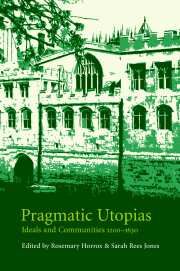Book contents
- Frontmatter
- Contents
- Preface
- List of abbreviations
- Richard Barrie Dobson: an appreciation
- 1 ‘If heaven be on this earth, it is in cloister or in school’: the monastic ideal in later medieval English literature
- 2 The ‘Chariot of Aminadab’ and the Yorkshire priory of Swine
- 3 Godliness and good learning: ideals and imagination in medieval university and college foundations
- 4 Hugh of Balsham, bishop of Ely 1256/7–1286
- 5 A cruel necessity? Christ's and St John's, two Cambridge refoundations
- 6 Coventry's ‘Lollard’ programme of 1492 and the making of Utopia
- 7 Thomas More's Utopia and medieval London
- 8 Social exclusivity or justice for all? Access to justice in fourteenth-century England
- 9 Idealising criminality: Robin Hood in the fifteenth century
- 10 Fat Christian and Old Peter: ideals and compromises among the medieval Waldensians
- 11 Imageless devotion: what kind of an ideal?
- 12 An English anchorite: the making, unmaking and remaking of Christine Carpenter
- 13 Victorian values in fifteenth-century England: the Ewelme almshouse statutes
- 14 Puritanism and the poor
- 15 Realising a utopian dream: the transformation of the clergy in the diocese of York, 1500–1630
- Bibliography of Barrie Dobson's published works
- Index
15 - Realising a utopian dream: the transformation of the clergy in the diocese of York, 1500–1630
Published online by Cambridge University Press: 01 July 2009
- Frontmatter
- Contents
- Preface
- List of abbreviations
- Richard Barrie Dobson: an appreciation
- 1 ‘If heaven be on this earth, it is in cloister or in school’: the monastic ideal in later medieval English literature
- 2 The ‘Chariot of Aminadab’ and the Yorkshire priory of Swine
- 3 Godliness and good learning: ideals and imagination in medieval university and college foundations
- 4 Hugh of Balsham, bishop of Ely 1256/7–1286
- 5 A cruel necessity? Christ's and St John's, two Cambridge refoundations
- 6 Coventry's ‘Lollard’ programme of 1492 and the making of Utopia
- 7 Thomas More's Utopia and medieval London
- 8 Social exclusivity or justice for all? Access to justice in fourteenth-century England
- 9 Idealising criminality: Robin Hood in the fifteenth century
- 10 Fat Christian and Old Peter: ideals and compromises among the medieval Waldensians
- 11 Imageless devotion: what kind of an ideal?
- 12 An English anchorite: the making, unmaking and remaking of Christine Carpenter
- 13 Victorian values in fifteenth-century England: the Ewelme almshouse statutes
- 14 Puritanism and the poor
- 15 Realising a utopian dream: the transformation of the clergy in the diocese of York, 1500–1630
- Bibliography of Barrie Dobson's published works
- Index
Summary
The Utopians expected their priests to be ‘of extraordinary holiness’ and in consequence they possessed ‘very few’. After Luther had shattered the unity of western Christendom and Sir Thomas More rallied to the defence of the Catholic Church, in A Dialogue concerning Heresies the latter repeated his conviction that excessive numbers had largely been responsible for the failings of the English secular clergy:
And as for me touchynge the choyce of prestys, I coulde not well devyse better provysyons than are by the lawes of the chyrche provyded all redy, if they were as well kept as they be well made. But for the nomber, I wold surely se suche a way therin, that we sholde not have suche a rabell …
The authorities, he believed, needed to implement a far more selective ordination system to redress the abuse: ‘yf the bysshops wolde ones take unto presthed better ley men and fewer … all the matter were more than halfe amended …’
The diocese of York certainly bears out More's assertion that men had been flocking to enter the Church in the early sixteenth century. The whole process, however, was reversed in the 1530s, when the dissolution first of the monasteries and then of the chantries greatly reduced the demand for priests and the numbers seeking ordination fell accordingly.
- Type
- Chapter
- Information
- Pragmatic UtopiasIdeals and Communities, 1200–1630, pp. 259 - 276Publisher: Cambridge University PressPrint publication year: 2001



